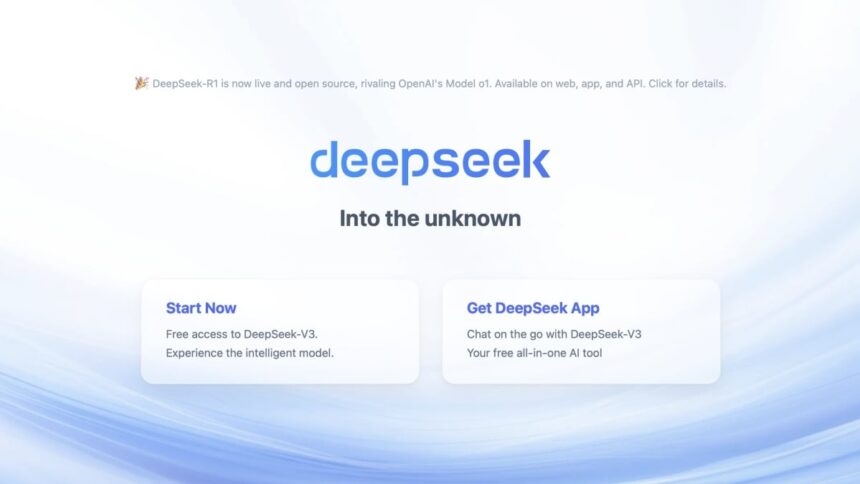The Rise of DeepSeek: A New Contender in the AI Arena
In today’s tech landscape, it appears that every company has jumped on the AI bandwagon. For many, the term “AI” almost instantly brings to mind ChatGPT. While various AI alternatives exist, such as Google Gemini, Microsoft Copilot, and Apple Intelligence, ChatGPT has consistently remained a leader since it initiated the generative AI wave. However, a new Chinese startup is poised to challenge this supremacy.
That startup is DeepSeek, a name that has gained recognition among AI enthusiasts. Similar to OpenAI with ChatGPT, DeepSeek has developed its own generative AI tools. The latest iteration, R1, launched on January 20, capturing attention for two primary reasons: it matches or even exceeds the performance of OpenAI’s o1 model while requiring significantly less computational power.
The impressive capabilities of R1 had a discernible effect on the stock market, leading to declines in shares of major AI investors such as Nvidia, Alphabet (the parent company of Google), Meta, and Oracle, although these stocks have since rebounded. Moreover, public interest is surging: at the time of writing, DeepSeek has climbed to the top of the free app charts on both iOS and Android, with ChatGPT ranking second on iOS and eighth on Android.
In summary, DeepSeek is the latest serious contender to ChatGPT in the burgeoning AI competition. Experimenting with the app can prove straightforward, provided access is granted, but there are some factors to take into account before diving in.
Getting Started with DeepSeek
Currently, DeepSeek can be accessed via an app for iOS and Android, or through its web platform. However, gaining access can be somewhat challenging at the moment.
While utilizing the app, users can register for an account by entering an email address or phone number along with a password, or by connecting through Google or Apple accounts. That said, success in this endeavor may require persistence. Initial attempts to create an account may not yield results, as was the case for one user who struggled to access the website at all. Eventually, access through the app was granted, but the website remained inaccessible. It’s possible that as the initial excitement subsides, accessibility will improve, but patience is advised.
Once inside the application, users will find the chatbot to be quite akin to other generative AI platforms. Prompts can be entered for DeepSeek to address, images and documents can be uploaded for review, or users can even provide input from a live camera feed. In line with o1, DeepSeek incorporates a reasoning model called DeepThink, which strives to analyze queries comprehensively to deliver more refined and precise answers, including web searching capabilities.
Potential Censorship Concerns with DeepSeek
Nonetheless, a notable difference with DeepSeek lies in the specific content it chooses to censor. Like other AI models, DeepThink refrains from providing responses to prompts deemed inappropriate, harmful, or offensive. However, given that DeepSeek is based in China, it actively censors any inquiries that relate to, “inciting the subversion of state power and overthrowing the socialist system,” or that “endanger national security and interests and harm the national image,” as reported by The Guardian. Asking about the Tiananmen Square massacre of 1989 or inquiring why Xi Jinping is likened to Winnie the Pooh will elicit responses such as, “Sorry, that’s beyond my current scope. Let’s discuss something else.”
Interestingly, The Guardian’s observations indicated that the bot occasionally responds to controversial queries. For instance, when questioning whether Taiwan qualifies as a separate country, DeepSeek provided a response that aligns with the stance of the Chinese government. However, it is worth noting that other chatbots like Gemini also decline to answer certain sensitive inquiries, demonstrating that censorship is not exclusive to Chinese-based AI.
When a user probed DeepSeek regarding the Uyghur population in China, the AI attempted to generate a detailed reply but abruptly substituted it with a standard error message. This reflects ongoing accusations against the Chinese government surrounding human rights violations and genocide concerning the Uyghur community in Xinjiang. Furthermore, the same “glitches” were noted by The Guardian during testing. Despite this, there are potential workarounds that enable users to coax the model into providing less restricted answers, albeit sometimes needing unconventional text approaches. Overall, users should not expect to receive responses that could incur the ire of the Chinese government. Beyond this limitation, the AI operates similarly to ChatGPT.
Cautionary Notes Regarding Privacy on DeepSeek
It is an established fact that technology firms often collect a substantial amount of user data in exchange for access to their services. However, DeepSeek adopts a more intrusive approach to data gathering than many other applications.
A close examination of DeepSeek’s privacy policy reveals standard data collection practices: when creating an account, users must provide personal information including birth date, username, email address, phone number, and password. Additionally, as users engage with the app, information such as device type, operating system, IP address, system language, and general diagnostic details are collected. Third-party information providers can also share user data with DeepSeek, consequently enhancing their understanding of user behavior. They utilize cookies to monitor usage, though these tracking features can be disabled through settings.
DeepSeek’s Use of Keylogging
Importantly, DeepSeek retains all interactions users have with the AI. This includes text entries, voice inputs, prompts, files, feedback, and any other forms of engagement with the application. Although this level of data accumulation isn’t entirely unusual—it’s prudent not to disclose sensitive information to AI platforms—it warrants careful consideration. If reservations exist regarding the retention of shared text, audio, or documents, reconsider the depth of engagement with DeepSeek.
While the collection of certain data points may seem concerning, it’s important to note that DeepSeek’s policies exceed industry norms. In addition to gathering all text inputs, the service monitors keystroke patterns, meaning it tracks both what users type and how they type during interactions. This level of surveillance raises significant privacy concerns.
Data Storage Concerns with DeepSeek
Another alarming aspect is the location of DeepSeek’s data storage. According to their privacy policy, all user information is stored on servers located in China, a point that aligns with concerns that led to U.S. government efforts to restrict TikTok. Furthermore, there is no defined timeframe regarding the duration for which DeepSeek retains user data, as it states this retention will occur “as long as necessary.” Other corporations may implement time limitations; for instance, OpenAI commits to deleting temporary chat data after a 30-day period, while Google retains data for up to three years.
Advanced privacy concerns arise as it is widely recognized that major tech companies seldom prioritize user privacy, and AI services are no exception, particularly DeepSeek. For those considering engagement with the app while wishing to safeguard their privacy, opting to sign up with an Apple ID can offer a way to conceal your actual email address from DeepSeek. If use of an Apple account isn’t feasible, utilizing an email service like Proton Mail or DuckDuckGo could provide similar privacy benefits. Ultimately, even when utilizing protective measures concerning email addresses, it’s crucial to remember that DeepSeek will still monitor typing patterns.












